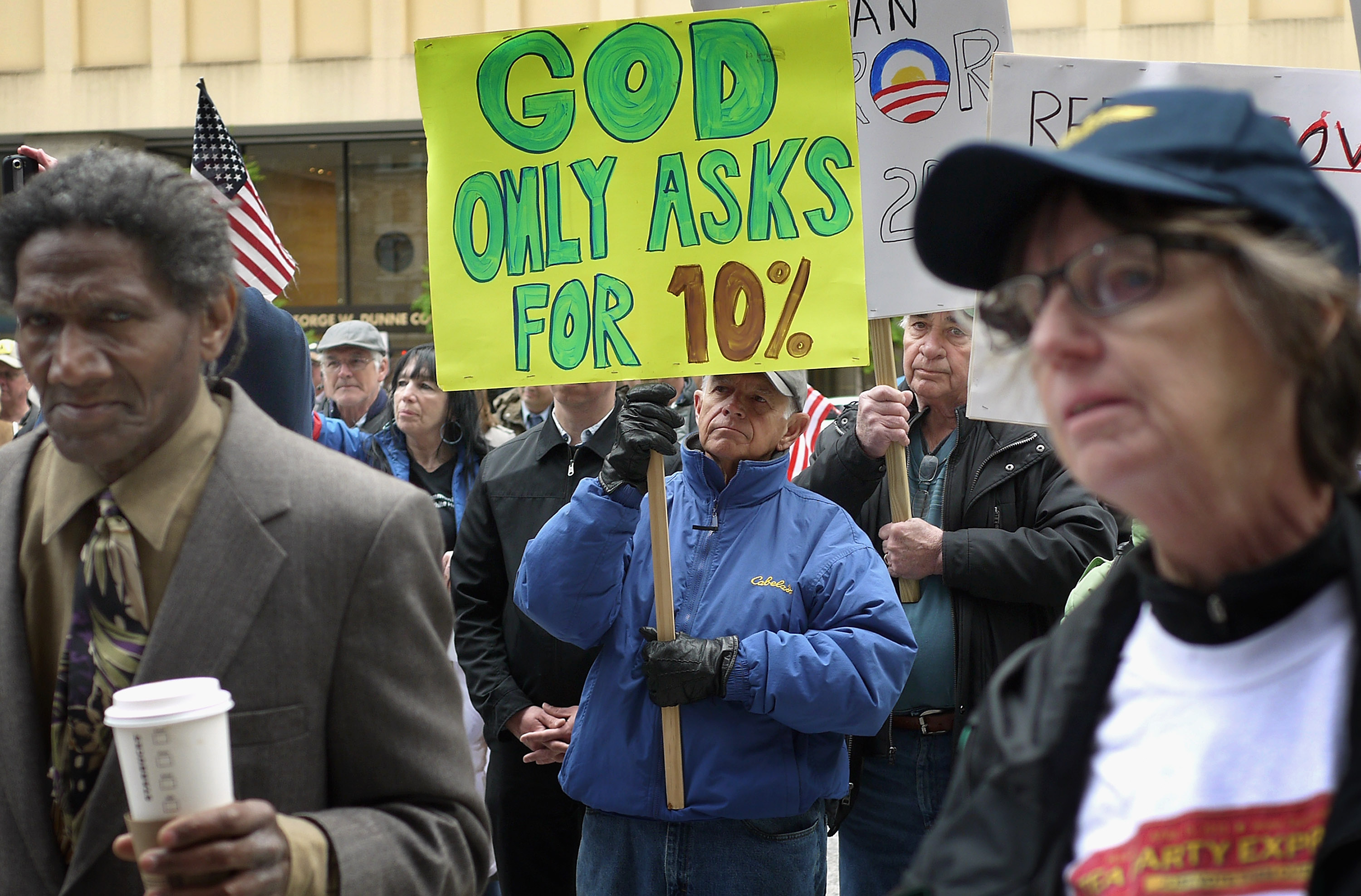Taxing the rich is an American tradition
SCOTT OLSON/Getty Images

Paul Krugman points out that proposals to introduce higher taxes on the rich — like the Buffett rule — have received serious pushback from conservatives:
As inequality has become an increasingly prominent issue in American discourse, there has been furious pushback from the right. Some conservatives argue that focusing on inequality is unwise, that taxing high incomes will cripple economic growth. Some argue that it's unfair, that people should be allowed to keep what they earn. And some argue that it's un-American — that we've always celebrated those who achieve wealth, and that it violates our national tradition to suggest that some people control too large a share of the wealth. [The New York Times]
But, as Krugman rightly points out, high taxes on the rich are hardly un-American. He points to Theodore Roosevelt and Irving Fisher as examples of the fact that "in the early 20th century, many leading Americans warned about the dangers of extreme wealth concentration, and urged that tax policy be used to limit the growth of great fortunes."
In fact, as Thomas Piketty's Capital in the 21st Century points out, "confiscatory taxation of excessive incomes — that is, taxation whose goal was to reduce income and wealth disparities, rather than to raise money — was an American invention."
The Week
Escape your echo chamber. Get the facts behind the news, plus analysis from multiple perspectives.

Sign up for The Week's Free Newsletters
From our morning news briefing to a weekly Good News Newsletter, get the best of The Week delivered directly to your inbox.
From our morning news briefing to a weekly Good News Newsletter, get the best of The Week delivered directly to your inbox.
This shouldn't really be very surprising. America was founded by a group of men deeply distrustful of monarchies, aristocracies, concentrated wealth, and inherited privilege, and who enacted laws to prevent wealth from concentrating in too few hands.
As Steven Budiansky noted in 2010:
With Thomas Jefferson taking the lead in the Virginia legislature in 1777, every Revolutionary state government abolished the laws of primogeniture and entail that had served to perpetuate the concentration of inherited property. Jefferson cited Adam Smith, the hero of free market capitalists everywhere, as the source of his conviction that (as Smith wrote, and Jefferson closely echoed in his own words), "A power to dispose of estates forever is manifestly absurd. The earth and the fullness of it belongs to every generation, and the preceding one can have no right to bind it up from posterity. Such extension of property is quite unnatural." Smith said: "There is no point more difficult to account for than the right we conceive men to have to dispose of their goods after death." [Liberal Curmudgeon]
A free daily email with the biggest news stories of the day – and the best features from TheWeek.com
John Aziz is the economics and business correspondent at TheWeek.com. He is also an associate editor at Pieria.co.uk. Previously his work has appeared on Business Insider, Zero Hedge, and Noahpinion.
-
 Did Alex Pretti’s killing open a GOP rift on guns?
Did Alex Pretti’s killing open a GOP rift on guns?Talking Points Second Amendment groups push back on White House narrative
-
 The 8 best hospital dramas of all time
The 8 best hospital dramas of all timethe week recommends From wartime period pieces to of-the-moment procedurals, audiences never tire of watching doctors and nurses do their lifesaving thing
-
 ‘Implementing strengthened provisions help advance aviation safety’
‘Implementing strengthened provisions help advance aviation safety’Instant Opinion Opinion, comment and editorials of the day
-
 Nobody seems surprised Wagner's Prigozhin died under suspicious circumstances
Nobody seems surprised Wagner's Prigozhin died under suspicious circumstancesSpeed Read
-
 Western mountain climbers allegedly left Pakistani porter to die on K2
Western mountain climbers allegedly left Pakistani porter to die on K2Speed Read
-
 'Circular saw blades' divide controversial Rio Grande buoys installed by Texas governor
'Circular saw blades' divide controversial Rio Grande buoys installed by Texas governorSpeed Read
-
 Los Angeles city workers stage 1-day walkout over labor conditions
Los Angeles city workers stage 1-day walkout over labor conditionsSpeed Read
-
 Mega Millions jackpot climbs to an estimated $1.55 billion
Mega Millions jackpot climbs to an estimated $1.55 billionSpeed Read
-
 Bangladesh dealing with worst dengue fever outbreak on record
Bangladesh dealing with worst dengue fever outbreak on recordSpeed Read
-
 Glacial outburst flooding in Juneau destroys homes
Glacial outburst flooding in Juneau destroys homesSpeed Read
-
 Scotland seeking 'monster hunters' to search for fabled Loch Ness creature
Scotland seeking 'monster hunters' to search for fabled Loch Ness creatureSpeed Read